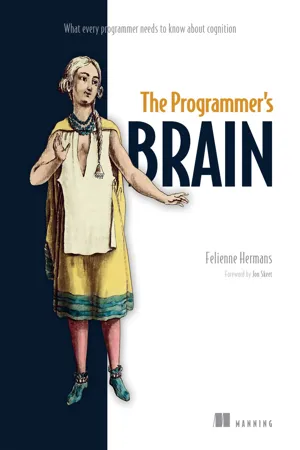
The Programmer's Brain
What every programmer needs to know about cognition
- 256 pages
- English
- ePUB (mobile friendly)
- Available on iOS & Android
About this book
"A great book with deep insights into the bridge between programming and the human mind." - Mike Taylor, CGI Your brain responds in a predictable way when it encounters new or difficult tasks. This unique book teaches you concrete techniques rooted in cognitive science that will improve the way you learn and think about code. In The Programmer's Brain: What every programmer needs to know about cognition you will learn: Fast and effective ways to master new programming languages
Speed reading skills to quickly comprehend new code
Techniques to unravel the meaning of complex code
Ways to learn new syntax and keep it memorized
Writing code that is easy for others to read
Picking the right names for your variables
Making your codebase more understandable to newcomers
Onboarding new developers to your team Learn how to optimize your brain's natural cognitive processes to read code more easily, write code faster, and pick up new languages in much less time. This book will help you through the confusion you feel when faced with strange and complex code, and explain a codebase in ways that can make a new team member productive in days! Foreword by Jon Skeet. About the technology
Take advantage of your brain's natural processes to be a better programmer. Techniques based in cognitive science make it possible to learn new languages faster, improve productivity, reduce the need for code rewrites, and more. This unique book will help you achieve these gains. About the book
The Programmer's Brain unlocks the way we think about code. It offers scientifically sound techniques that can radically improve the way you master new technology, comprehend code, and memorize syntax. You'll learn how to benefit from productive struggle and turn confusion into a learning tool. Along the way, you'll discover how to create study resources as you become an expert at teaching yourself and bringing new colleagues up to speed. What's inside Understand how your brain sees code
Speed reading skills to learn code quickly
Techniques to unravel complex code
Tips for making codebases understandable About the reader
For programmers who have experience working in more than one language. About the author
Dr. Felienne Hermans is an associate professor at Leiden University in the Netherlands. She has spent the last decade researching programming, how to learn and how to teach it. Table of Contents
PART 1 ON READING CODE BETTER
1 Decoding your confusion while coding
2 Speed reading for code
3 How to learn programming syntax quickly
4 How to read complex code
PART 2 ON THINKING ABOUT CODE
5 Reaching a deeper understanding of code
6 Getting better at solving programming problems
7 Misconceptions: Bugs in thinking
PART 3 ON WRITING BETTER CODE
8 How to get better at naming things
9 Avoiding bad code and cognitive load: Two frameworks
10 Getting better at solving complex problems
PART 4 ON COLLABORATING ON CODE
11 The act of writing code
12 Designing and improving larger systems
13 How to onboard new developers
Tools to learn more effectively

Saving Books

Keyword Search

Annotating Text

Listen to it instead
Information
Table of contents
- The Programmer's Brain
- Copyright
- contents
- front matter
- Part 1. On reading code better
- 1 Decoding your confusion while coding
- 2 Speed reading for code
- 3 How to learn programming syntax quickly
- 4 How to read complex code
- Part 2. On thinking about code
- 5 Reaching a deeper understanding of code
- 6 Getting better at solving programming problems
- 7 Misconceptions: Bugs in thinking
- Part 3. On writing better code
- 8 How to get better at naming things
- 9 Avoiding bad code and cognitive load: Two frameworks
- 10 Getting better at solving complex problems
- Part 4. On collaborating on code
- 11 The act of writing code
- 12 Designing and improving larger systems
- 13 How to onboard new developers
- epilogue
- index
Frequently asked questions
- Essential is ideal for learners and professionals who enjoy exploring a wide range of subjects. Access the Essential Library with 800,000+ trusted titles and best-sellers across business, personal growth, and the humanities. Includes unlimited reading time and Standard Read Aloud voice.
- Complete: Perfect for advanced learners and researchers needing full, unrestricted access. Unlock 1.4M+ books across hundreds of subjects, including academic and specialized titles. The Complete Plan also includes advanced features like Premium Read Aloud and Research Assistant.
Please note we cannot support devices running on iOS 13 and Android 7 or earlier. Learn more about using the app